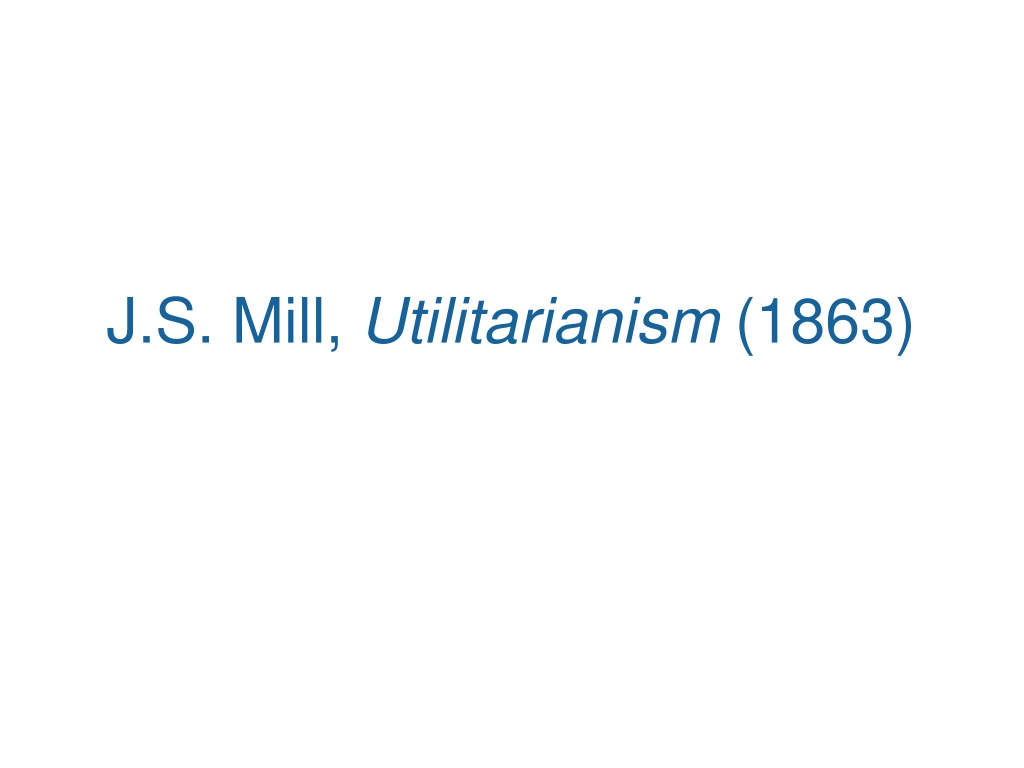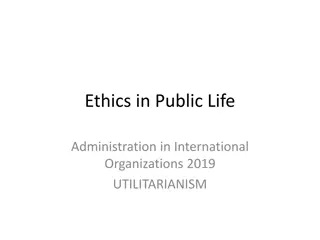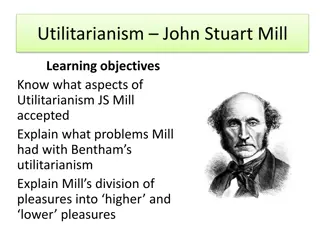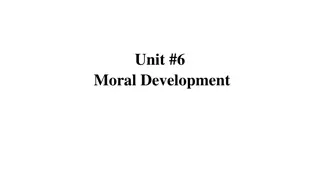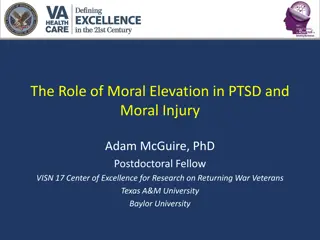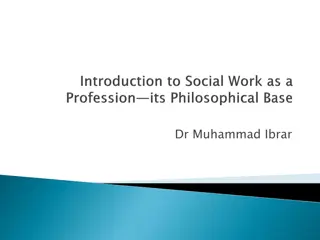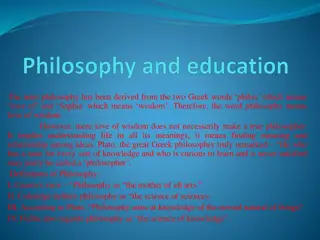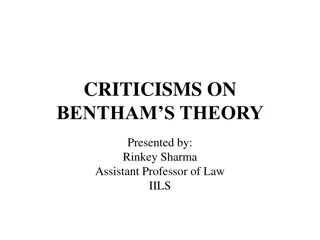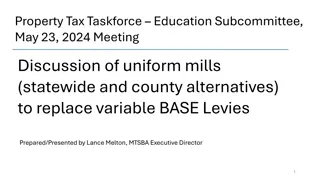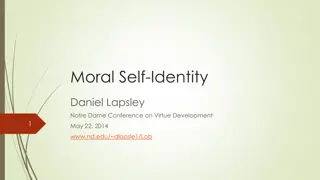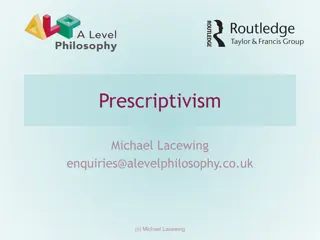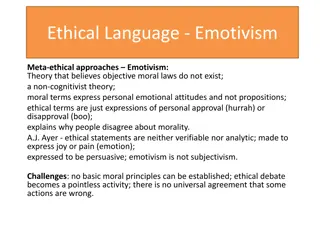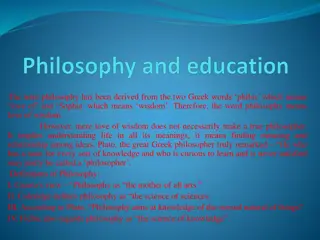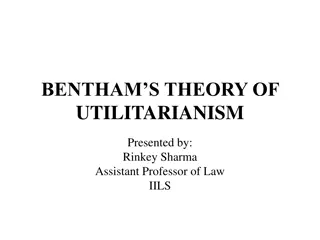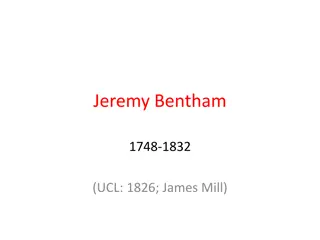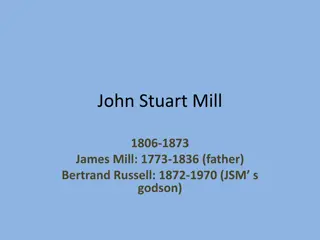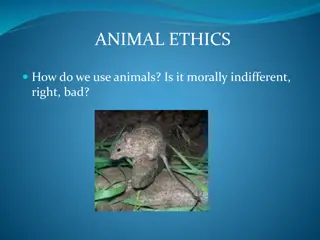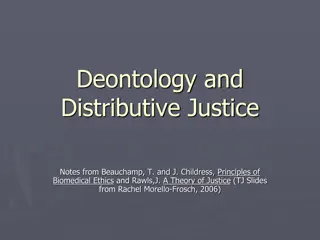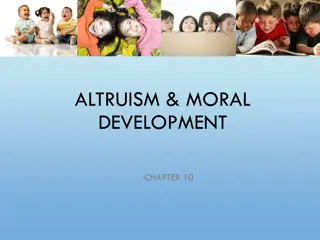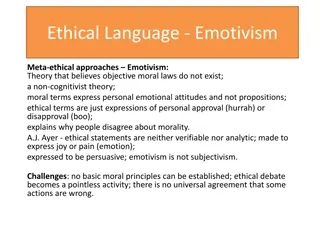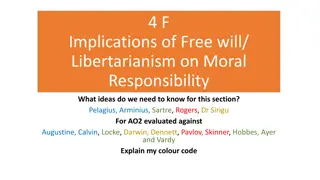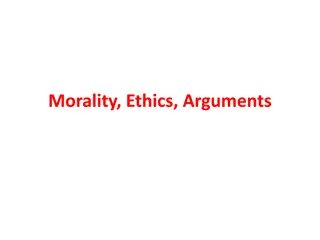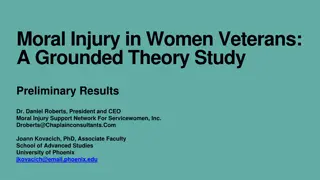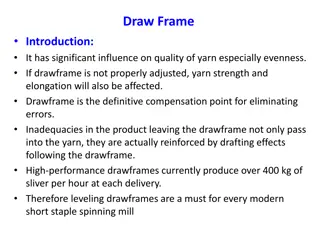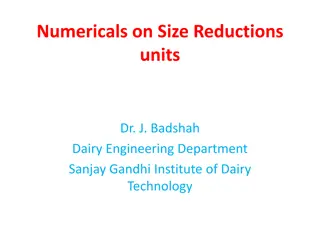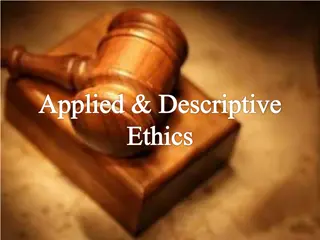Understanding Mill's Utilitarianism and Moral Philosophy
Explore John Stuart Mill's work on Utilitarianism, consequentialism, and hedonistic consequentialism. Discover how moral questions are evaluated based on actions and consequences, and delve into the principle of seeking happiness for sentient beings to determine moral value.
Download Presentation

Please find below an Image/Link to download the presentation.
The content on the website is provided AS IS for your information and personal use only. It may not be sold, licensed, or shared on other websites without obtaining consent from the author. Download presentation by click this link. If you encounter any issues during the download, it is possible that the publisher has removed the file from their server.
E N D
Presentation Transcript
John Stuart Mill (1806-1873, England) Mill had a lifelong goal of reforming the world in the interest of human well- being http://plato.stanford.edu/entries/mill / Image of JS Mill from Wikimedia Commons, public domain
Groups on moral questions Read the question assigned to your group (see instructions on the doc) and write down: Your own answers to the question What you think a utilitarian who agrees with Mill would say about it http://is.gd/PHIL102Mill
When asking what is right/wrong morally, what to evaluate? Action Consequences Person Intention Motive Habitual disposition to act in someways What kind of act is it? Whatwas actually done? Whatresults from the action? Mill focuseshere
Consequentialism whether an act is morally right depends only on consequences (as opposed to the intrinsic nature of the act or anything that happens before the act). Stanford Encyclopedia of Philosophy on consequentialism: http://plato.stanford.edu/entries/consequentialism/#ClaUti
Hedonistic consequentialism Value hedonism: all and only pleasure is intrinsically valuable and all and only pain is intrinsically disvaluable. -- Internet Encycl. of Philosophy: http://www.iep.utm.edu/hedonism/#SH1b Hedonistic consequentialism: we can determine the moral value of consequences, and therefore of acts, by how much pleasure/pain produced
Utilitarianism, Chpt 1 There ought either to be some one fundamental principle or law, at the root of all morality, or if there be several, there should be a determinate order of precedence among them (1). What is that principle, for Mill?
Simplified overview of Mills Utilitarianism We can judge the moral value of actions by the degree of happiness they tend to produce for the sentient creatures involved
Greatest Happiness Principle actions are [morally] right in proportion as they tend to promote happiness, [morally] wrong as they tend to produce the reverse of happiness (Mill, Chpt. 2, p. 2). happiness is defined in terms of pleasure and reduction or absence of pain
Support for GHP (more in Chpt. IV) pleasure, and freedom from pain, are the only things desirable as ends (2) Mill on the highest good (5) The end of human action is necessarily also the standard of morality (5) Pleasure, reduction of pain (self &others) goal goal goal
Pleasure as only intrinsic value (p. 2, & Chpt4) S o Use happiness, defined in terms of pleasure, to evaluate consequences of acts S o Decide if acts moral/immoral withGreatest Happiness Principle (GHP) Which consequences to look at to do so? What was intended as consequence? Actual Usual consequences the acthad? consequences for this kindof act?
Consequences for whom? Sentient beings(5) Not the whole world for all actions (6) Impartiality (5)
Different kinds of pleasures Mill distinguishes between different kinds of pleasures in Chpt. 2: intellectual & sensual
Which kind of pleasure is best, and why? Those who have experienced both prefer the higher, intellectual pleasures (3-5) Sensual pleasures only Sensual & intellectual A pig satisfied A Socrates dissatisfied
Do we have to calculate consequences each time we act? No; we can use subordinate principles from the fundamental principle (GHP) (8) These are drawn from human experience of which kinds of actions tend to promote more/less pleasure & pain (7-8)
Greatest Happiness Principle (GHP): acts are morally right as they tend to produce happiness Use GHP to determine subordinate rules by asking about usual tendencies of kinds of actions Subordinate rules (7-8) e.g., lying is usually wrong (7) ActR/W? ActR/W? ActR/W? ActR/W?
Chpt IV: Argument for GHP (optional reading) 1. Pleasure/happiness is the only thing desirable as an end goal of human action: the only intrinsically good thing 2. We should use the only intrinsically good thing to decide which acts are morally right/wrong 3. More of what is intrinsically good is better than less Therefore, we can judge which acts are morally right/wrong by how much happiness they produce for all involved
Chpt V: Utilitarianism & Justice Two questions addressed here: 1. What differentiates justice from the rest of morality? 2. Would utilitarianism allow people to act unjustly if that would promote more happiness in a group overall?
Examples What produces happiness Study for exams What we should compel people to do or avoid (14) Morality Be generous What people have a right to (15) -- what protects security (16) Avoid theft Justice
Question 2: Would utilitarianism allow people to act unjustly if that would promote more happiness in a group overall?
Still Even rules of justice can be overridden sometimes by other moral duties (17).
Act vs Rule utilitarianism A distinction that didn t exist when Mill was writing AU: moral value of acts judged by utility of consequences of those (kinds of) acts RU: moral value of acts judged by whether they follow rules; rules judged by utility of their consequences if generally accepted and/or followed
Act utilitarianism Rule utilitarianism Principle of utility (e.g., Mill s GHP) Principle of utility (e.g., Mill s GHP) ActR/W? ActR/W? ActR/W? Rules with high acceptance and/or obedience utility ActR/W? ActR/W? ActR/W?
